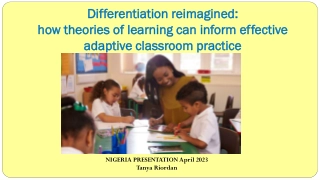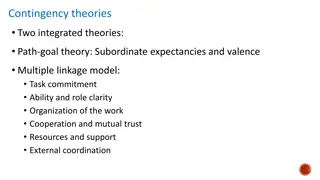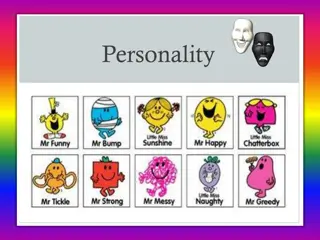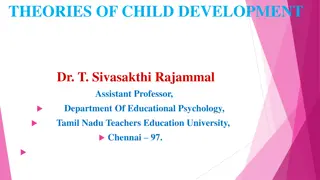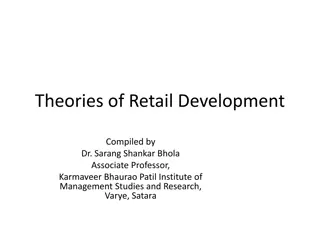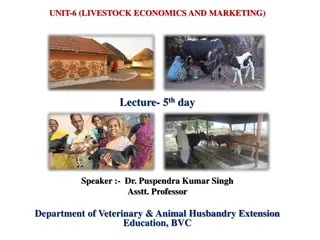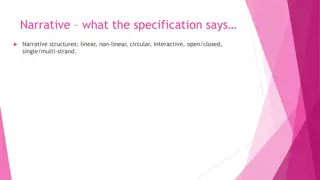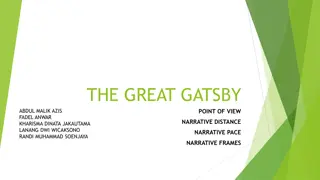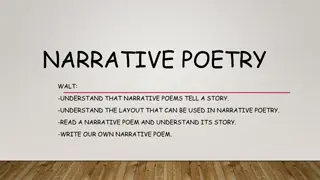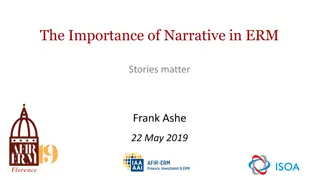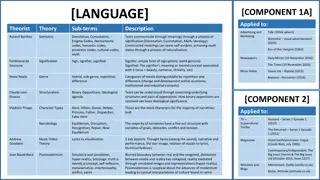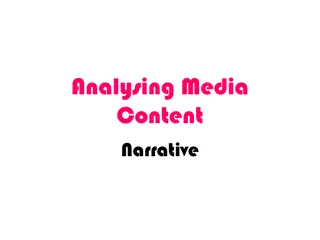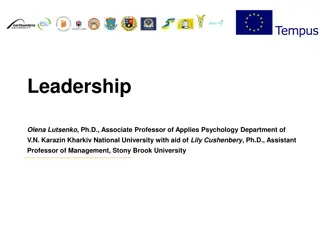Reimagining Differentiation: Enhancing Classroom Practice Through Learning Theories
Explore how theories of learning can inform effective adaptive classroom practice, focusing on the concept of differentiation. The presentation delves into reimagining differentiation, key theories supporting it, and practical strategies to support differentiation in language classrooms. The researc
0 views • 35 slides
Leadership Theories and Power Dynamics in Organizations
Explore contingency theories, dyadic theories, power and influence concepts, and leadership lessons from "12 Angry Men". Dive into the significance of leader-member exchange (LMX), political skills, and the interplay between power, politics, and organizational efficiency.
0 views • 27 slides
Theories Explaining Deviant Sexual Behavior Throughout History
Explore historical theories on deviant sexual behavior, including demonological, anomie, psychoanalytical, human ecology, and somatotyping theories. These theories range from supernatural beliefs of possession to scientific interpretations of societal influences and individual characteristics.
2 views • 33 slides
Testing Extended Theories of Gravity Using Black Hole Shadows
Exploring the shadows of black holes as a method to test extended theories of gravity, this study discusses the existence of black holes, gravitational wave astronomy, and direct imaging. Researchers Oleg Zenin, Stanislav Alexeyev, Alexandra Nemtinova, and Artem Baiderin present findings on black ho
5 views • 18 slides
Insights into Theories of Motivation and Their Application
Motivation, a driving force behind human behavior, is explored through various theories like Maslow's hierarchy of needs, McClelland's learned needs theory, and others. Understanding these theories can help organizations enhance worker productivity by addressing different motivational factors.
9 views • 21 slides
Understanding Key Nursing Philosophies and Theories
Explore the development of nursing philosophies and theories with a focus on prominent figures like Henderson, Orem, Roy, Rogers, Leninger, and Pender. Delve into the historical stages of philosophical development in nursing and the three schools of thought in nursing. Engage in group discussions an
10 views • 12 slides
Understanding Business Ethics Theories and Principles
Explore various business ethics theories including Ethical Concepts, Moral Behavior Development, Ethical Principles, and the Role of Ethics in Business. Delve into the concept of ethics, moral behavior evolution, ethical principles like autonomy, honesty, justice, and integrity, and the importance o
10 views • 17 slides
Managerial Theories and Criticisms
Delve into the world of management theories, from classical to modern approaches, exploring the foundational principles of management, the evolution of theories, and criticisms of traditional perspectives. Learn about the basic functions of management and the insightful perspectives of renowned theo
2 views • 11 slides
Understanding Personality: Theories, Types, and Assessment
Exploring the intricate world of personality, this comprehensive guide delves into major theories of personality development, assessment methods, cultural influences, and key contributors. Discover the different types of personalities, including Type A and Type B, and unravel the complexities of psy
1 views • 96 slides
Introduction to Organizational Behavior: Management Theories and Practices
Explore the evolution of organizational behavior from early management theories to contemporary practices. Understand the historical foundations and relevance of management theory in shaping workplace dynamics. Delve into key concepts like Scientific Management, Administrative Management, Bureaucrat
1 views • 28 slides
Understanding Theories of Child Development by Dr. T. Sivasakthi Rajammal
Child development theories such as Erikson's psycho-social theory, Piaget's cognitive development theory, and Kohlberg's moral development theory explain how children grow and change across different stages of childhood. These theories focus on various aspects of development including social, emotio
0 views • 27 slides
Theories on the Origin of State: Divine, Force, Patriarchal, and More
Various theories such as Divine Origin, Force Theory, Patriarchal Theory, and others explain the origin of the state. Divine theories attribute state creation to God, while Force Theory emphasizes the strong subjugating the weak to establish authority. Each theory offers unique perspectives on the h
1 views • 24 slides
Theories of Retail Development and Environmental Adaptation
The theories of retail development explore different frameworks such as Environmental, Cyclical, and Conflictual theories to understand how retail evolves and adapts to changing environments. The Environment Theory emphasizes the importance of adapting to survive in a competitive market, while the C
0 views • 14 slides
Psychological Theories of Criminality: Understanding the Roots
Psychological theories of criminality delve into the association between intelligence, personality, learning, and criminal behavior. Major theories include Psychodynamic Theory by Freud, Behavioral Theory by Bandura, and Cognitive Theory by Kohlberg. These theories explore how unconscious mental pro
1 views • 20 slides
Understanding Psychological Theories of Criminal Behavior
Psychologically-based criminologists attribute criminal behavior to individual factors such as negative early childhood experiences and inadequate socialization, leading to criminal thinking patterns and incomplete cognitive development. Probation and parole practices are influenced by rehabilitatio
0 views • 30 slides
Exercise in Narrative Style Transformation
Practice transforming narrative styles in storytelling through a series of examples where dialogues are rewritten into narratives. The exercises focus on changing direct speech into indirect speech while maintaining the essence of the original conversations. Each task presents a scenario followed by
1 views • 26 slides
Understanding Narrative Research Design in Qualitative Research
Narrative research is a qualitative research approach that focuses on sharing individuals' stories. Researchers collect and interpret personal narratives to understand individual experiences. Key characteristics, data collection methods, steps, and ethical considerations in narrative research are ex
0 views • 20 slides
Exploring Leadership Theories: Traits and Behaviors
Leadership theories have evolved from trait theory focusing on personal qualities to behavioral theories emphasizing actions and interactions. While early research sought universal traits for leadership, it encountered challenges due to varied traits among leaders and non-leaders. Behavioral theorie
2 views • 29 slides
Understanding Livestock Economics and Marketing: Theories and Concepts
Explore the essential theories and concepts in livestock economics and marketing discussed by Dr. Puspendra Kumar Singh. Topics include cost theories, cost functions, production functions, fixed costs, variable costs, and their relevance to managerial decisions and market situations.
1 views • 39 slides
Understanding Narrative Structures in Media: Linear vs. Non-Linear
Explore the concepts of linear and non-linear narrative structures in media storytelling, analyzing how they are used to engage audiences effectively. Dive into well-known stories like Alice in Wonderland, Hansel and Gretel, and Jack and the Beanstalk to understand the difference between narrative a
0 views • 17 slides
Unraveling COVID-19 Conspiracy Theories and Hoaxes
Exploring various conspiracy theories surrounding the origins of COVID-19, from bat soup to bioweapons and espionage. Dive into wilder theories involving population control, world war, and even Disney's supposed predictions. Understand the differences between conspiracy theories and hoaxes, shedding
2 views • 11 slides
Understanding Narrative Elements in "The Great Gatsby
Explore the narrative elements in "The Great Gatsby" such as point of view, narrative distance, and narrative pace. The novel is analyzed from chapters 5 to 9, focusing on Nick Carraway's first-person perspective and the small narrative distance, which adds realism to the story.
0 views • 11 slides
Understanding Sociological Theories and Frameworks
Sociological theories, encompassing micro and macro perspectives, provide a lens to interpret societal dynamics. Consensus theories like functionalism emphasize shared norms, while conflict theories such as Marxism highlight social inequalities. Social action theories like interactionism focus on in
3 views • 21 slides
Online Seminar: Theories of Learning in Initial Teacher Education
This collection of online seminar slides introduces pre-service teachers to major theories of learning, including the Science of Learning through cognitive neuroscience. The presentation aims to help educators consider implications for teaching, recognize theories in action, and pose critical questi
1 views • 11 slides
Theories of Causation in Psychological and Social Sciences
Overview of theories of causation categorized into psychological, social psychological, and sociological perspectives. Psychological theories focus on instinctive, biological, and psychological qualities of abusers, including Attachment Theory, Psychodynamic Theory, Social Learning Theory, and Situa
0 views • 15 slides
Introduction to Quantum Chromodynamics & Field Theories in High-Energy Physics
Explore the fundamentals of Quantum Chromodynamics and Classical Field Theories in this informative lecture, covering topics such as global and local symmetries, Lagrangians, actions, and dynamics. Understand the significance of global and local symmetries in classical field theories, along with exa
2 views • 17 slides
Comprehensive Overview of Student Affairs Theories
This collection explores key theories in student affairs, including cognitive-structural theories, learning theories, and person-environment theories. Cognitive-structural theories delve into how individuals process information, while learning theories examine how people absorb knowledge. Person-env
3 views • 19 slides
Understanding Theories and Concepts in Research
The content delves into the fundamental concepts of theories and variables in research. It discusses the nature of theories, including descriptive, explanatory, and predictive theories. Additionally, it examines the role of concepts in providing identity and meaning to objects and phenomena. Through
2 views • 55 slides
Classical Trade Theories and Their Limitations in International Economics
Classical trade theories such as the Theory of Absolute Advantage by Adam Smith and the Theory of Comparative Advantage by David Ricardo highlight the benefits of free trade and specialization based on natural advantages. However, these theories have limitations, such as the inability to explain sce
0 views • 8 slides
Understanding Narrative Stories and Plot Structure
A narrative text is a story composed of various elements such as characters, setting, conflict, events, climax, and resolution. The structure of a narrative story can be dissected into parts like beginning, middle, and end, each serving a specific purpose in storytelling. By plotting the story on a
0 views • 13 slides
Applying Theories and Models in Integrated Health: Module 3 Overview
This module delves into the application of various theories, perspectives, and practice models in integrated healthcare. Students will learn to utilize different theories to enhance their understanding and practice in integrated health, focusing on aspects like personal impact, behavioral change the
0 views • 78 slides
Accelerating Lemma Learning Using Joins in Satisfiability Modulo Theories
Explore the use of joins in accelerating lemma learning within the context of Satisfiability Modulo Theories (SMT). The study covers various SMT applications at Microsoft and delves into the development of the Z3 solver. Key topics include theories, arithmetic operations, array theory, uninterpreted
0 views • 25 slides
Dive into Narrative Poetry
Explore the essence of narrative poetry by understanding its storytelling nature, layout, features, and common poetry techniques. Delve into an example poem, "Skippy the Naughty Kangaroo," to grasp the main characters, narrative elements, and the story it conveys. Through this journey, you'll enhanc
0 views • 11 slides
The Power of Narrative in ERM and Economics
Narrative plays a crucial role in risk management, as it helps in better understanding and decision-making. The use of stories in risk dashboards and economic narratives can convey complex information effectively. Robert Shiller's concept of narrative economics explores how popular stories impact ec
0 views • 27 slides
In-depth Analysis of Visual Communication Theories and Narrative Structures in Media
Explore the intricacies of semiotics, representation, narrative structures, and gender theories in various forms of media such as advertising, music videos, magazines, and TV shows. Delve into the works of influential theorists like Roland Barthes, Stuart Hall, Judith Butler, and bell hooks to under
0 views • 4 slides
Theories and Concepts in Semantics: Classical vs. Prototype Approaches
Explore different theories of concepts in semantics, including classical theories based on necessary and sufficient conditions, causal theories, and prototype theories. Compare their strengths and limitations in handling fuzziness, asymmetry, and internal structure of concepts. Discover how experime
1 views • 46 slides
Integrating Theories and Models for Enhanced Health Practice
Explore the application of theories, perspectives, and practice models in integrated health through Module 3. Learn how theories guide assessment, treatment, and patient outcomes. Discover common theories enhancing assessment and supporting individuals through grief and loss. Gain insights into the
0 views • 78 slides
Understanding Narrative Structures in Media Content
Narrative in media content involves how stories are told, focusing on structure and conventions. Key elements include Todorov's narrative theory, basic narrative structures, and Propp's character spheres of action, all of which shape the way stories unfold in films and other media.
0 views • 13 slides
Comprehensive Overview of Leadership Theories and Styles
Leadership encompasses the ability to influence a group towards achieving goals by knowing oneself, communicating vision, building trust, and taking effective action. Various leadership styles include Autocratic, Democratic, Free-Rein, and Paternalistic, each with distinct decision-making approaches
0 views • 19 slides
Understanding Leadership Theories and Styles
Leadership involves influencing a group towards a common goal. Traits, interaction styles, and group dynamics play vital roles in effective leadership. Various theories, such as Trait Theories and Synthetic Leadership Theories, provide insights into different aspects of leadership. Understanding lea
0 views • 41 slides
